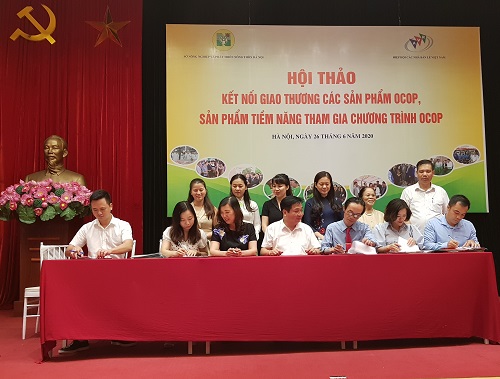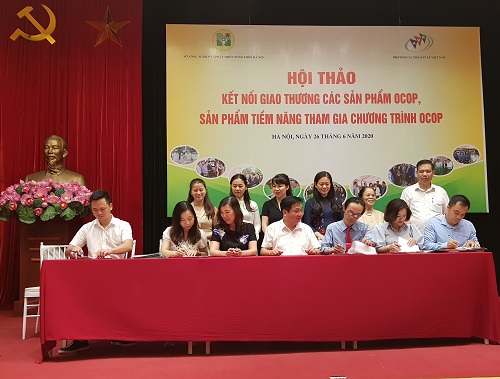[ad_1]

HÀ NỘI — Many business households and enterprises in Hà Nội which are part of the One Commune, One Product (OCOP) programme hope the Hà Nội Department of Agriculture and Rural Development and the Vietnam Retailers Association will facilitate more trade linkages for OCOP products.
At the first workshop on trading connections for OCOP products held in Hà Nội on Monday, director of the Ba Vì Clean Food Joint Stock Company Nguyễn Thanh Vân said his company had a slaughter capacity of about 200 chickens and 150 pigs each month to supply fresh meat and processed products for local markets.
At present, the company is looking for partners to promote the supply of those products for supermarkets, he said.
Meanwhile, many handicraft villages must reduce production due to impacts of the COVID-19 pandemic, including Hà Thái village in Thường Tín District specialising in lacquer products and Phú Vinh village in Chương Mỹ District specialising in bamboo and rattan products.
They do not have many new export orders so they are seeking partners to develop the domestic market and stabilise production, the Hà Nội Mới (new Hà Nội) newspaper reported.
Speaking at the workshop, Vũ Thị Hậu, chairwoman of the Vietnam Retailers Association, said the association will organise meetings between its members who are supermarkets and chain stores in Hà Nội and nationwide and manufacturers of OCOP products to promote consumption. When retailers have direct contact with manufacturers, intermediary costs are reduced and consumers also benefit.
According to Director of Hà Nội-based BigC Thăng Long Supermarket Khúc Tiến Hà, the BigC Supermarket has about 50 OCOP products from localities, including many agricultural and regional specialties. However, this is a small number among the thousands of goods sold at the supermarket.
The OCOP products, including agricultural and food products, face difficulties in entering the supermarket because the suppliers lack documents on product quality. The supermarket expects to meet the manufacturers to promote cooperation in production and consumption of products, Hà said.
This workshop on promoting trading activities for the OCOP products opened opportunities for the manufacturers and the traders to seek solutions on developing OCOP products and markets for those products.
According to deputy director of the Hà Nội Department of Agriculture and Rural Development Tạ Văn Tường, the department and other relevant offices will continue to organise trade linkage programmes to promote development of all stages from production to consumption for OCOP products.
Hà Nội has 301 products recognised as part of OCOP programmes, including Đồng Phú organic rice, Thụy Lâm sticky rice, Phù Đổng fresh milk and Bát Tràng ceramics.
At present, there are many other goods that have completed procedures for being recognised as an OCOP product.
The capital city of Hà Nội has 1,350 craft villages and more than 5,000 products are tagged with traceability codes, including agriculture, forestry, fisheries and food. They are potential products for the OCOP programme.
This year, Hà Nội expects to add 800 to 1,000 products to the OCOP programme. — VNS
[ad_2]
Source link
